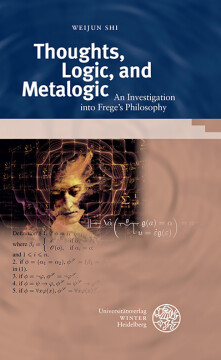
BUCH
Thoughts, Logic, and Metalogic
An Investigation into Frege’s Philosophy
Beiträge zur Philosophie, Neue Folge
2022
Zusätzliche Informationen
Bibliografische Daten
Abstract
It is in heavy dispute in the literature whether Frege’s conception of logic is universalism and excludes the possibility of metalogical investigations. In the book, the author argues that there is indeed tension between universalism and non-universalism in it, which finds expression in Grundgesetze. It dismisses the notion of reinterpretation playing a crucial role in the post-Tarskian metalogical investigations as illegitimate; for a Language in which a theory, whose Subject matter is thoughts rather than formulae per se, is formulated must not be reinterpreted in that fully interpreted formulae express different thoughts once reinterpreted. However, it does not preclude such metalogical investigations that do not make use of the notion: they are not only legitimate, understandable to it but also indispensable to Frege’s logicist project.
Inhaltsverzeichnis
| Zwischenüberschrift | Seite | Aktion | Preis |
|---|---|---|---|
| Umschlag | Cover | ||
| Titel | 3 | ||
| Imprint | 4 | ||
| Abstract | 5 | ||
| Acknowledgements | 7 | ||
| Contents | 9 | ||
| Introduction | 11 | ||
| 1 Thoughts and Thought Identity | 19 | ||
| 1.1 Thoughts | 19 | ||
| 1.1.1 The top-down approach to thoughts | 21 | ||
| 1.1.2 The bottom-up approach to thoughts | 24 | ||
| 1.2 Criteria for Thought Identity | 26 | ||
| 1.2.1 The bottom-up approach to thought identity | 31 | ||
| 1.2.2 The top-down approach to thought identity | 44 | ||
| 1.2.3 Objections to senses as objects | 52 | ||
| Summary | 61 | ||
| 2 Thoughts and truth | 63 | ||
| 2.1 Arguments against Truth as a Property | 63 | ||
| 2.1.1 The regress arguments and responses | 63 | ||
| 2.1.2 Responses to the regress arguments | 66 | ||
| 2.1.3 The inconsistency of the notion of truth | 67 | ||
| 2.2 Eliminability and Definability | 72 | ||
| 2.2.1 Does eliminability exclude truth as a property? | 72 | ||
| 2.2.2 Definability of truth | 75 | ||
| Summary | 81 | ||
| 3 Frege on Logical Truth | 83 | ||
| 3.1 Universalism, Schematism and Modernism | 83 | ||
| 3.1.1 Universalism | 83 | ||
| 3.1.2 Modernism | 87 | ||
| 3.1.3 Schematism | 90 | ||
| 3.2 The Universalist Conception of Logical Truth | 94 | ||
| 3.2.1 Logical truths as the utmost generality | 95 | ||
| 3.2.2 Problems with the notion of U-logical truth | 98 | ||
| 3.2.3 Objections to the notion of U-logical truth | 107 | ||
| 3.3 Frege’s Conception of Independence | 115 | ||
| 3.3.1 Frege’s notion of independence | 116 | ||
| 3.3.2 Problems with Frege’s substitutional method | 121 | ||
| Summary | 122 | ||
| 4 The Tension between Universalism and Nonuniversalism in ‚Grundgesetze‘ | 125 | ||
| 4.1 Universalism and Nonuniversalism in Grundgesetze? | 125 | ||
| 4.1.1 Total functions | 127 | ||
| 4.1.2 Four readings of §§29-31 | 135 | ||
| 4.2 Restricted Domains of Quantification and Linguistic Completeness | 159 | ||
| Summary | 172 | ||
| 5 Universalism and Metalogic | 173 | ||
| 5.1 Arguments for and against the Non-metalogic Thesis | 173 | ||
| 5.1.1 Two kinds of metalogics | 173 | ||
| 5.1.2 Truth-predicate and metalogic | 178 | ||
| 5.1.3 Logic ‚as the‘ langauge and metalogic | 187 | ||
| 5.1.4 Logic per se, logicism, and metalogic | 197 | ||
| 5.1.5 Circularity and metalogic | 208 | ||
| 5.2 The Permutation Argument in §10 | 214 | ||
| 5.2.1 Model-theoretical readings of the permutation argument | 218 | ||
| 5.2.2 Ricketts’ reading of the permutation argument | 232 | ||
| 5.3 The Consistency Proof in §31 | 240 | ||
| 5.3.1 From the perspectives of the universalist and auxiliary readings | 241 | ||
| 5.3.2 From the perspective of the nonauxiliary reading | 242 | ||
| 5.3.3 From the perspective of the completely nonauxiliary reading | 243 | ||
| Summary | 249 | ||
| Conclusion | 251 |


 Publishing Platform by CloudPublish
Publishing Platform by CloudPublish